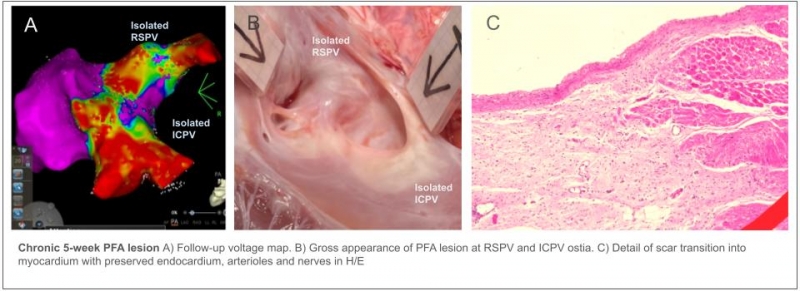THE FIRST PRECLINICAL EXPERIENCES WITH THE NEW SINGLE-SHOT PFA MULTI-ELECTRODE MESH BASKET CATHETER TO TREAT ATRIAL FIBRILLATION
Background: AF catheter ablation using thermal energies is associated with indiscriminate tissue destruction. Pulsed field ablation (PFA) with adapted sub-second electric – fields create pores in cell membranes – caused irreversible electroporation.
Methods
The study catheter (EasyPulz, BTL) has a compressible mesh basket, expandable up to 32 mm. The tip has 32 independently addressable electrodes. A multichannel PF train was applied to isolate thoracic veins in 34 swines that survived for 30 days (12/34) or 5 hours. The catheter was deployed in the targeted vein ostium. After electrode contact was verified , PEF was applied. Two index procedures were conducted. In the experiment I, PF was applied in exactly two partially shifted applications. In experiment II, the catheter was placed in a single position. A standard, double and quadruple doses were studied. The target was the elimination of atrial potentials. PF was repeated in case of insufficient potentials' suppression. In selected animals, an extra PF dose was administered deep in the SVC to study vein stenosis.
Results
All veins were acutely isolated (99/99). In experiment II, catheter repositioning was not needed in 74% and 91% of cases for dose A and B. Histopathology in acute animals showed moderate surface local extravasation of erythrocytes, inflammatory infiltrate and transmural cytology changes. Multiple repetitions in the tested range did not affect the general safety profile. After 5 weeks, scar durability was confirmed in all targeted veins (33/33). Necropsy and histopathology showed transmural scar lesion, preserved endocardium, arteries and nerves, visible transition to healthy myocardium.
Conclusion
The new PFA system with expandable mesh catheter can achieve durable isolation of the targeted veins, usually within a single catheter position.


